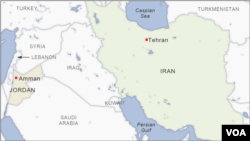Iranian authorities have confirmed the arrest of a well-known Arab activist following weeks of speculation about his disappearance in Turkey.
Iran’s Ministry of Intelligence said in a statement last week that Habib Chaab, an Iranian Arab dissident, is now in the Iranian government’s custody. The ministry did not say how and where the activist was arrested. Chaab has been charged with planning a terrorist operation in Iran.
In the statement, Chaab was described as the former leader and the current vice president of the al-Ahwaziya group. He disappeared in Turkey around mid-October, days after his arrival from Sweden.
Al-Ahwaziya group, also known as the Arab Struggle Movement for the Liberation of Ahwaz (ASMLA), is a Netherlands-based Arab nationalist group that advocates for the secession of Iran’s Arab-majority Khuzestan province. Tehran considers the ASMLA a terrorist organization.
The ASMLA had claimed responsibility for the 2018 attack on a military parade of the Islamic Revolutionary Guard Corps (IRGC) in the Iranian city of Ahwaz, Khuzestan. The attack killed 25 people and wounded more than 60, including IRGC personnel.
The attack was also claimed by the Islamic State (IS) terror group.
In his televised confession, which was broadcast on Iranian state television last Thursday, Chaab, a dual Iranian-Swedish citizen, said he was directed and influenced by Saudi Arabia and received funds from the Saudi government to carry out operations inside Iran, a claim rejected by the ASMLA.
“Some of the confessions [Chaab] made are baseless and have no roots in reality,” said Fouad Bin Mohammed al-Kabi, the deputy president for foreign affairs for al-Ahwaz Democratic Popular Front, an ally of the ASMLA.
“We were utterly shocked by the confessions and claims he made,” al-Kabi told VOA, adding that Chaab “was confessing to things that were miles away from the Habib we knew for years. We believe those confessions were made under massive coercion.”
Iran has often accused Saudi Arabia, its archrival in the Middle East, of supporting Iranian opposition groups. Saudi officials reject such accusations.
Intelligence cooperation
Experts say Iranian intelligence agencies in recent years have expanded their activity in neighboring countries, particularly in Turkey, where they have strengthened ties with their Turkish counterparts.
“There are patterns that prove that Turkish and Iranian intelligence are collaborating on more cases, particularly with the dissidents, separatists and activists,” said Arvin Khoshnood, an Iran expert and a senior fellow at the Lund University in Sweden.
In July, Masih Alinejad, a VOA Persian TV host, said IRGC agents were trying to exert pressure on her family to lure her from New York to Turkey where, she believed, she would be abducted and returned to Iran.
In April, Turkish state-run news agency Anadolu reported that Iran had handed over to Turkish authorities a Kurdish militant affiliated with the outlawed Kurdistan Workers’ Party (PKK).
Analyst Khoshnood believes Habib Chaab could have been handed over to the Iranians in exchange for two PKK insurgents who were in Iranian custody. Iranian Arab opposition groups also claimed that Iran has made such an exchange with Turkey.
The Turkish government has not made any statements about Chaab’s case.
Coerced confessions
According to a report released by the Paris-based International Federation for Human Rights (FIDH) in July 2020, the Iranian state-owned broadcaster, IRIB, broadcast around 355 forced confessions between 2009 and 2019.
Kaveh Kermanshahi, a Berlin-based Iranian Kurdish activist who says he was forced by Iranian authorities to make a confession while in prison in 2011, told VOA that Iranian government interrogators use complicated methods to force prisoners to make confessions under duress.
“The interrogator … put me in solitary confinement for one month, trying to make me come to his submission and confess untruly in front of a camera so he could gather elements he needed to complete the scenario he was working on,” he said.
Kermanshahi added that his interrogator wanted him to make a false confession about his alleged affiliation with a Kurdish rebel group. Kermanshahi said he did not make such a confession.





